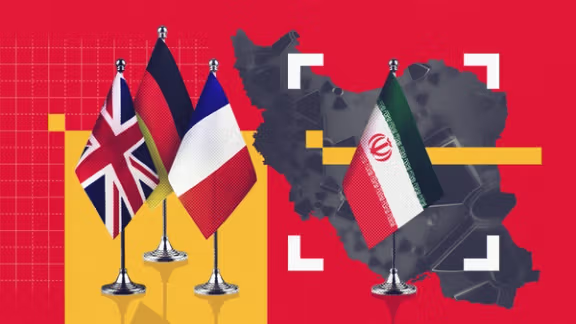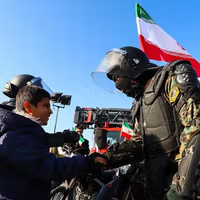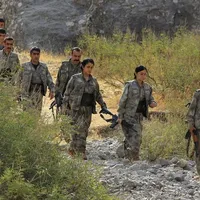“The best way to prevent Iran from rebuilding its influence in the new Syria is to have a strong Syria... weakening the new Syria goes exactly against that,” Juneau told Eye for Iran. “That’s why I struggle to see how Israel, in the longer term, is acting in favor of its own interests.”
Israel launched airstrikes on Syria's defense ministry and an area adjoining the presidential palace on July 16 following days of sectarian killings between Bedouin tribes and members of the Druze minority in southern Syria.
Israel cited a need to protect the Druze, an ethnoreligious community which also lives in Israel and the Israeli-occupied Golan Heights.
The UK-based Syrian Observatory for Human Rights reported on Sunday that the past week’s violence killed 1,120 people, including 427 Druze fighters, 298 Druze civilians, 354 government security forces and 21 Sunni Bedouin.
But the Israeli strikes may risk destabilizing the already fragile central government of former jihadist-turned-president Ahmed al-Sharaa, Juneau said.
“To actively work against the creation of a new Syria, where there is a once-in-a-lifetime opportunity now... this could easily fall back against Israel itself,” said Juneau, an associate fellow with the Chatham House's Middle East and North Africa Program.
“The more unstable the new Syria is, the more it creates openings for Iran to rebuild its influence.”
Israel appears to be adamantly opposed to the new rulers of Damascus.
Diaspora Affairs Minister Amichai Chikli called for Syrian President Ahmed al-Sharaa to be assassinated in a statement posted in both English and Hebrew on his X account on July 15.
“Anyone who thinks Ahmad al-Sharaa is a legitimate leader is gravely mistaken — he is a terrorist, a barbaric murderer who should be eliminated without delay,” Chikli wrote.
The next day, Israeli jets pounded heart of Damascus, in an attack that was caught live on a news broadcast as the anchor ducked for cover.
A large flag flying outside the stricken defense ministry which replaced that of the ousted Assad dynasty dictatorship was left shredded.
US Special Envoy to Syria Tom Barrack has taken aim at Israel’s intervention, describing the strikes to the Associated Press as “poorly timed” and a setback to ongoing efforts to stabilize the region.
Tehran eyes comeback amid Syrian chaos
Iran is likely exploiting Syria’s current instability to reactivate dormant networks tied to the former Assad regime, said Juneau, who previously served as the Canadian Department of National Defense's strategic policy analyst focused on the Middle East.
“There is no doubt in my mind that the Islamic Republic will try—probably already is trying—to rebuild its influence networks in Syria, especially with dissatisfied elements and former regime elements,” he told Eye for Iran.
Under Bashar al-Assad, Syria had become Iran’s closest state ally, acting as a conduit for arms to Hezbollah, a strategic launchpad for attacks against Israel, and a hub for Islamic Revolutionary Guard Corps (IRGC) commanders and loyalist militias.
Al-Sharaa, Syria's de facto president, has taken steps to block Iranian re-entry into Syria, including cutting arms transfer routes to Hezbollah that would be used against Israel and working to prevent the return of Iranian influence.
Israeli strikes playing into Iran's hands?
Iran has long justified its refusal to negotiate or normalize ties with Israel on ideological and strategic grounds. But Juneau warned that Israel’s current actions could validate Tehran’s narrative that diplomacy is futile.
“What message does it send when Israel not only hits Iranian and former Iranian assets in Syria, but actively hits the new Syrian government?” he asked. “I think it sends a very negative message... to the Sharaa administration itself, which has clearly said it has no hostile intentions towards its neighbors, including Israel.”
You can watch the full episode of Eye for Iran on YouTube or listen on any major podcast platform like Spotify, Apple, Amazon Music and Castbox.















